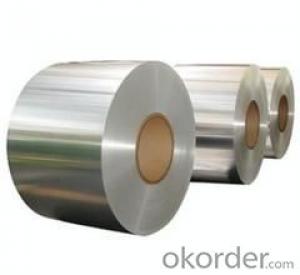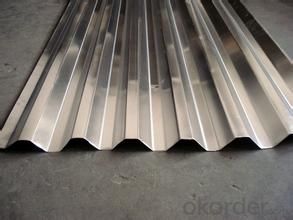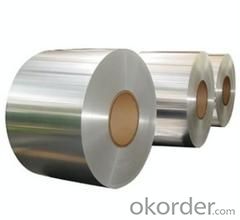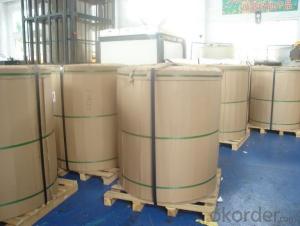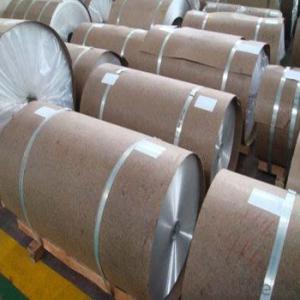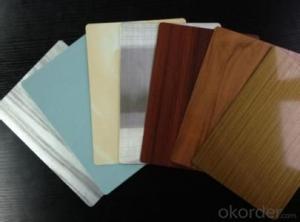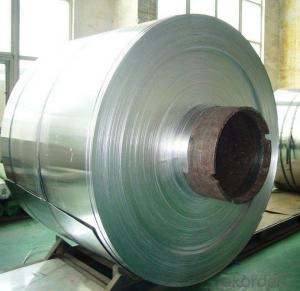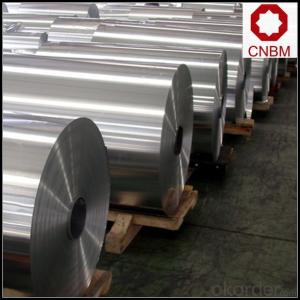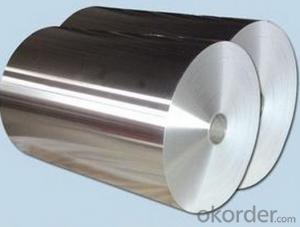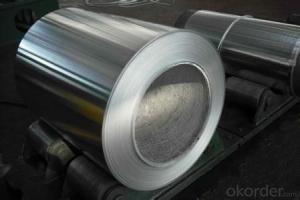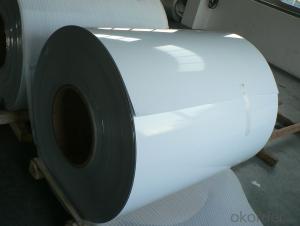6061 Aluminum Coil Manufacture for Roofing 3003 H14
- Loading Port:
- China Main Port
- Payment Terms:
- TT OR LC
- Min Order Qty:
- -
- Supply Capability:
- -
OKorder Service Pledge
OKorder Financial Service
You Might Also Like
Aluminium is a relatively soft, durable, lightweight, ductileand malleablemetalwith appearance ranging from silvery to dull gray, depending on the surfaceroughness. It is nonmagnetic and does not easily ignite. A fresh film ofaluminium serves as a good reflector (approximately 92%) of visible lightand an excellent reflector (as much as 98%) of medium and far infraredradiation. The yield strength of pure aluminium is 7–11 MPa,while aluminium alloys have yield strengths ranging from200 MPa to 600 MPa. Aluminium has about one-third the densityand stiffness of steel. It is easily machined,cast, drawn and extruded.
Aluminium alloys (or aluminum alloys; see spellingdifferences) are alloysin which aluminium(Al) is the predominant metal. The typical alloying elements are copper, magnesium,manganese,silicon,tin and zinc. There are twoprincipal classifications, namely casting alloys and wrought alloys, both of which are furthersubdivided into the categories heat-treatableand non-heat-treatable. About 85% of aluminium is used for wrought products,for example rolled plate, foils and extrusions.Cast aluminium alloys yield cost-effective products due to the low meltingpoint, although they generally have lower tensile strengthsthan wrought alloys. The most important cast aluminium alloy system is Al–Si,where the high levels of silicon (4.0–13%) contribute to give good castingcharacteristics. Aluminium alloys are widely used in engineering structures andcomponents where light weight or corrosion resistance is required
Specification:
Alloy: AA1050, 1060, 1100,AA3003, 3005, 3015, 5052, 5754, 5083,8011, etc
Temper:H14/16/18/22/24/32, HO etc.
Thickness:0.2mm—100mm
Width: 100mm—2300mm (Can be slitted)
InnerDiameter: 508MM
Coil Weight:500kg-3000kg(Max.)
Application:Foil stock, Circles, Roofing, Can stock, Marine plate,Anti-slipery purpose in vehicles, packing and appliance.
Features:
1. Excellent quality of products
2. Quick delivery
3. Best service to clients
4. BV,SGS avalible
5. No buckle o waveness
6. Tension leveling
7. Certificate of Origin
8. Form A,E
Packaging Detail:
Carton ,Woodenpallet with plastic protection packing ,standard seaworthy packing or as yourrequest.
ProductionCapacity:
AnnualProduction capacity of 600,000 tons.
Products areexported to United States, Canada, U.A.E, Brazil, Mexico,Thailand, Vietnam,Nigeria etc, over 100 countries andregions all over the world.
Production Line:
CNBM aluminumproduction base is comprised of 18 aluminumannealers, 10 coil and foilmills, 4 continuous production lines, 2hot rolling production line and 3prepainted lines.
FAQ:
1. What is the form of payment?
Normally 30% TT, L/C
2. Type of quotation?
FOB, CFR, CIF
3. Port of loading?
Shanghai port
4. Delivery time?
30 day after client’s deposit
- Q: How are aluminum coils used in HVAC systems?
- The excellent heat transfer properties and durability of aluminum coils make them widely used in HVAC systems. These coils play a vital role in cooling by efficiently extracting heat from the air. In HVAC systems, you will typically find aluminum coils in the condenser and evaporator units. The condenser coil releases heat to the surroundings by transferring it to the outdoor air, while the evaporator coil absorbs heat from indoor air, cooling it down. Aluminum is the preferred material for these coils because of its high thermal conductivity, allowing for efficient heat transfer. The coils consist of thin aluminum fins attached to aluminum tubes. This design maximizes the coil's surface area, enabling better heat exchange between the refrigerant flowing through the tubes and the air passing over the fins. During the cooling process, the coil's refrigerant absorbs heat from the indoor air, transforming it into a gas. The heat is then transferred to the aluminum fins, where it dissipates into the surrounding air. Consequently, the air passing through the evaporator coil becomes cooler, creating a comfortable indoor environment. Similarly, in the condenser unit, the refrigerant releases heat to the outdoor air through the aluminum coils. This allows the refrigerant to return to its liquid state, ready to be cycled back to the evaporator coil for the cooling process to continue. Aluminum coils are also favored in HVAC systems due to their corrosion resistance, ensuring their longevity and reliability. They are lightweight, making installation and maintenance easier. Moreover, aluminum coils are recyclable, contributing to a more sustainable and eco-friendly HVAC system. In summary, aluminum coils are crucial components of HVAC systems, providing efficient heat transfer, durability, and corrosion resistance. Their use greatly contributes to the cooling and comfort of indoor spaces.
- Q: Can aluminum coils be used for food processing conveyor systems?
- Yes, aluminum coils can be used for food processing conveyor systems. Aluminum is a popular choice for conveyor systems in the food processing industry due to its various beneficial properties. Firstly, aluminum is a lightweight material, which makes it easier to install and transport. This is particularly important for conveyor systems that may require frequent reconfiguration or relocation. Additionally, aluminum has excellent corrosion resistance, which is crucial in food processing environments where exposure to moisture, chemicals, and food particles is common. Furthermore, aluminum is a hygienic material that is easy to clean and maintain, ensuring food safety standards are met. Lastly, aluminum coils can be easily formed and customized to fit specific conveyor system requirements, allowing for efficient and effective food processing operations. Therefore, aluminum coils are a suitable choice for food processing conveyor systems.
- Q: How much will be burned out if the soaked and oxidized 5182 aluminum coil is melt down and reprocessed?
- Burn out rate is generally between 1% -2.5%, but that varies among plants as their actual situations are different.
- Q: Can aluminum coils be formed into different shapes?
- Yes, aluminum coils can be formed into different shapes. Aluminum is a highly malleable metal, which means it can easily be bent, shaped, and formed without breaking. This property makes it an ideal material for various applications where flexibility and versatility are required. Aluminum coils can be formed into different shapes using a variety of techniques, such as bending, rolling, stamping, extrusion, or even by using specialized machinery like a coil forming machine. These processes allow the aluminum coils to be transformed into a wide range of shapes, including sheets, plates, tubes, wires, or complex three-dimensional forms. The ability to form aluminum coils into different shapes makes it an excellent choice for industries such as construction, automotive, aerospace, and manufacturing, where customized parts and components are often needed.
- Q: Is it possible to create personal roofing material using aluminum coils?
- <p>Yes, you can use aluminum coils to make your own roofing material. Aluminum is a popular choice due to its durability, lightweight, and resistance to corrosion. To create roofing material, you would need to cut the coils to appropriate lengths, form them into panels, and possibly add protective coatings or finishes. However, this process requires specialized equipment and knowledge of roofing construction to ensure the material is safe, watertight, and structurally sound. It's also important to consider local building codes and regulations that may affect the suitability of homemade roofing materials.</p>
- Q: Can aluminum coils be used for industrial piping?
- Yes, aluminum coils can be used for industrial piping. Aluminum is a versatile and lightweight material that offers several advantages for industrial piping applications. It has excellent corrosion resistance, which makes it suitable for various industries, including chemical, petrochemical, and food processing. Aluminum coils are also easy to work with and can be formed into different shapes and sizes, allowing for flexibility in designing and installing piping systems. Additionally, aluminum has good thermal conductivity, which is beneficial for applications that require heat transfer. However, it is important to consider the specific requirements of the industrial process and consult with experts to ensure that aluminum coils are suitable for the intended application.
- Q: Is it possible to utilize an aluminum coil as a light source?
- <p>Aluminum coil itself cannot be used as a light source. Aluminum is a good conductor of electricity but does not emit light when electrified like certain materials can. To create light, materials like tungsten in incandescent bulbs or phosphors in fluorescent lights are used. Aluminum coils can, however, be used in conjunction with other components in lighting fixtures, such as in heat sinks to dissipate heat from LEDs, but they do not produce light directly.</p>
- Q: Can aluminum coils be used in the manufacturing of medical devices?
- The use of aluminum coils in the manufacturing of medical devices is possible. Aluminum is a versatile material that offers numerous advantages for medical device production. It possesses qualities such as being lightweight, corrosion-resistant, and possessing good thermal conductivity. These properties make aluminum coils suitable for a variety of medical applications, including medical imaging equipment, surgical instruments, and prosthetics. Medical imaging devices, like MRI and CT scanners, often utilize aluminum coils for transmitting and receiving electromagnetic signals. Aluminum's electrical conductivity allows for efficient signal transmission, improving the precision and quality of medical imaging. Furthermore, the lightweight nature of aluminum makes it easier to handle and maneuver during medical procedures. Surgical instruments also benefit from the use of aluminum coils in their manufacturing. These instruments require materials that are both sterilizable and durable, with high strength. Aluminum meets these criteria as it can be easily sterilized using various methods, such as steam, ethylene oxide, or gamma irradiation. Additionally, its durability ensures that the instruments can withstand repeated sterilization cycles without degradation, while its high strength guarantees they can endure the forces applied during surgical procedures. Moreover, aluminum can be employed in the production of prosthetics, specifically artificial limbs. The lightweight nature of aluminum makes it an excellent choice for creating prosthetic devices that are comfortable for patients to wear and move around with. Additionally, its corrosion-resistant properties make it suitable for long-term use, as it can endure exposure to body fluids and environmental factors. In conclusion, the use of aluminum coils in the manufacturing of medical devices is indeed possible. The lightweight, corrosion-resistant, and electrically conductive properties of aluminum make it a valuable material for medical applications, contributing to the development of advanced and reliable medical devices.
- Q: How do aluminum coils compare to plastic coils in terms of durability?
- When it comes to durability, aluminum coils outperform plastic coils. Aluminum is renowned for its strength and ability to resist wear and tear, making it a highly durable material. It can withstand heavy usage without cracking, breaking, or deforming under pressure. In contrast, plastic coils are more susceptible to damage, particularly with repetitive use or extreme temperatures. Although plastic coils may be cost-effective and lightweight, they may not maintain their quality over time. Consequently, for those prioritizing durability, aluminum coils are the superior option due to their longer lifespan and increased resistance to damage.
- Q: Are aluminum coils suitable for food packaging?
- Yes, aluminum coils are suitable for food packaging. Aluminum is widely used in the food packaging industry due to its numerous beneficial properties. Firstly, aluminum is a non-toxic and non-reactive material, ensuring that there is no transfer of harmful substances into the food. It is also impermeable to gases and moisture, providing an effective barrier against oxygen, light, and moisture that can spoil the food or affect its taste and quality. Additionally, aluminum coils are lightweight, making them easy to transport and handle. They are also highly flexible, allowing for easy shaping and forming into different packaging designs. Furthermore, aluminum is a good conductor of heat, allowing for efficient heat transfer during food processing or cooking. Finally, aluminum is a sustainable and recyclable material, making it an environmentally friendly choice for food packaging. Overall, aluminum coils are a suitable and widely used option for food packaging due to their safety, barrier properties, lightweight nature, flexibility, heat conduction capabilities, and sustainability.
Send your message to us
6061 Aluminum Coil Manufacture for Roofing 3003 H14
- Loading Port:
- China Main Port
- Payment Terms:
- TT OR LC
- Min Order Qty:
- -
- Supply Capability:
- -
OKorder Service Pledge
OKorder Financial Service
Similar products
Hot products
Hot Searches
Related keywords

